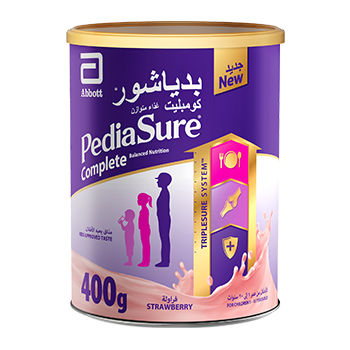PediaSure® Complete
- Main Image
-

- Subtitle
- Child Nutritional Supplement – From 1 to 10 Years Old
- Title
- PediaSure® Complete Vanilla
- Detail Page Path
Discusses critical nutrients for bone health including calcium, vitamin D, and phosphorus, and their roles in bone strengthening and growth.
Provides a list of dietary sources rich in bone-building nutrients, emphasizing the importance of a balanced diet for optimal bone development.
Explores when supplementation might be necessary to meet the nutritional requirements for bone health, especially in cases of dietary restrictions.
Did you know there are 206 bones in the adult body? They provide structure for the body and protection for the organs, and they make it possible to walk, run and move about. Bone development is most rapid in infancy, and bones grow and strengthen in childhood. They must last a lifetime, so you want them to start healthy and strong.
Peak bone mass is achieved between the ages of 10 and 18. Children with lower bone mass may be at greater risk for fractures. Building bone requires intake of calcium on an ongoing basis. Calcium is absorbed into the bone to create a kind of “bank account.” Because bone mass decreases in all adults- some experts say at about age 30-the more your child builds early, the stronger her bones will be later.
Certain nutrients are especially important for developing a strong, healthy skeleton for good growth. These include:
Calcium – responsible for construction, formation, and maintenance of bones and teeth
Vitamin D – promotes calcium absorption and helps to form and maintain strong bones
Phosphorus – combines with calcium to form calcium phosphate, which is the substance that gives the skeleton rigidity
Magnesium – approximately 50% of total body magnesium is found in bone and contributes to the physical structure of the bone
Breast milk is the best for babies. The World Health Organization (WHO) recommends exclusive breastfeeding for the first six months and should be continued for as long as possible.
Don’t forget the calcium – make sure milk and other calcium-rich foods are part of your child’s diet every day (500 mg/day is recommended for children 1-3 years old, 600mg/day for those aged 4-6 years, and 700mg/day for 7-9 year olds).1
Balance your diet – include vitamins and minerals necessary for bone health and a well-balanced diet.
Absorb all you can – vitamin D is necessary for calcium absorption.
Be active – in addition to a healthy diet, exercise is fundamental for bone development. Provide the opportunity for age-appropriate, safe physical activity on a regular basis.



ANI-JOR-PN-2024-4417
You are about to exit for another Abbott country or region specific website.
Please be aware that the website you have requested is intended for the residents of a particular country or region, as noted on that site. As a result, the site may contain information on pharmaceuticals, medical devices and other products or uses of those products that are not approved in other countries or regions.
The website you have requested also may not be optimized for your specific screen size.
Do you wish to continue and exit this website?
Stay Connected